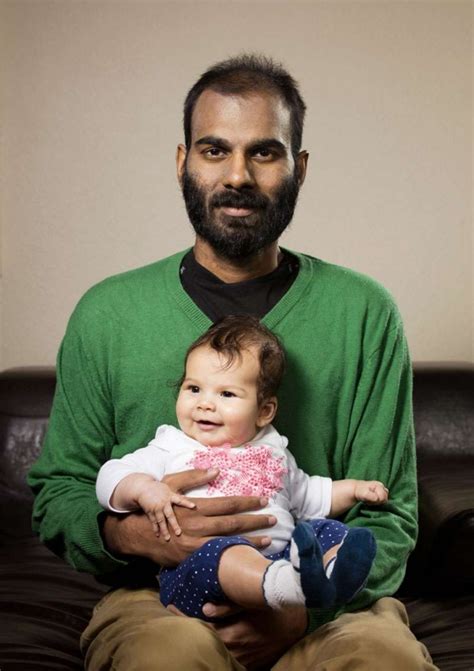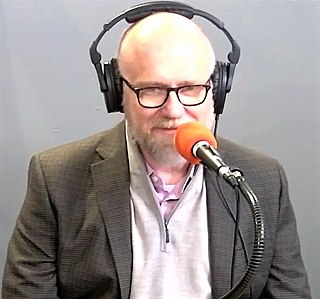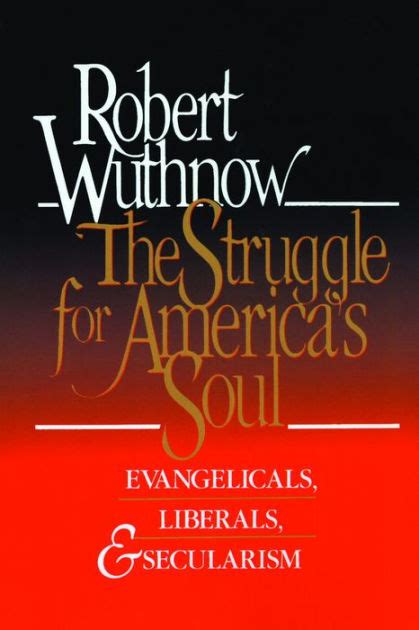Top 259 Empirical Quotes & Sayings - Page 4
Explore popular Empirical quotes.
Last updated on April 19, 2025.
Louis Brandeis actually changes his mind about women's suffrage because he works with these brilliant women in the women's suffrage movement like Josephine Goldmark, his sister-in-law, where he writes a Brandeis brief which convinced the court to uphold maximum hour laws for women by collecting all these facts and empirical evidence.
It's an empirical question whether training makes one more or less likely to get in a fight outside the gym. In some ways, I'm probably more likely to get into a fight, because I feel more competent, and I know what it's cost me in the past to back down from fights, and I don't want to feel that way.
I am a lay historian by nature. I seek out an empirical reflection of what truth is. I sort of want dates and motivations and I want the whole story. But I've always felt, unconsciously, that all human history is that connection from person to person to person, event to event to event, and from idea to idea.
On the philosophical level, both Buddhism and modern science share a deep suspicion of any notion of absolutes, whether conceptualize as a transcendent being, as an eternal, unchanging principle such as soul, or as a fundamental substratum of reality. ... In the Buddhist investigation of reality, at least in principle, empirical evidence should triumph over scriptural authority, no matter how deeply venerated a scripture may be.
The monopoly capitalists - even while employing purely empirical methods - weave around art a complicated web which converts it into a willing tool. The superstructure of society ordains the type of art in which the artist has to be educated. Rebels are subdued by its machinery and only rare talents may create their own work. The rest become shameless hacks or are crushed.
During my sojourn in ironclad atheism, the primary arsenal leveled against Christianity had been its failure on empirical grounds. Surely, enlightened reason offered a more coherent cosmos. Surely, Occam's razor cut the faithful free from blind faith. There is no proof of God; therefore, it is unreasonable to believe in God.
In my view, philosophers have shown a great deal more respect for the first-person point of view than it deserves. There's a lot of empirical work on the various psychological mechanisms by way of which the first-person point of view is produced, and, when we understand this, I believe, we can stop romanticising and mythologising the first-person perspective.
If we wish to draw philosophical conclusions about our own existence, our significance, and the significance of the universe itself, our conclusions should be based on empirical knowledge. A truly open mind means forcing our imaginations to conform to the evidence of reality, and not vice versa, whether or not we like the implications.
Humans in modern societies are driven by a perhaps desperate hope that they might find some way of mobilizing their theoretical and empirical knowledge and their evaluative systems so as both to locate themselves and their projects in some larger imaginative structure that makes sense to them. ... Furthermore, many modern agents would like it to be the case that the form of orientation which their life has is, if not true, at least compatible with the best available knowledge.
Science is empirical, all about physical senses that tell us about the world. But physical senses are not the only senses we have. Nobody has ever seen a thought. Nobody has ever seen a feeling. And yet thoughts and feelings are where we live our lives most immediately, and science cannot connect with that.
The kind of approach I take is different from much of experimental philosophy. Although the experimental philosophers and I are certainly in agreement about the relevance of empirical work to philosophy, a good deal of their work is devoted to understanding features of our folk concepts, and in this respect, at least, I see them as making the same mistake as those armchair philosophers who are interested in conceptual analysis.
Two decades ago, however, socialism and communism died rudely, then were buried forever by the empirical demonstration of the superiority of market capitalism everywhere from Thatcher's England to Deng's China, where just the partial abolition of socialism lifted more people out of poverty more rapidly than ever in human history.
Both education and religion need to ground themselves within the story of the universe as we now understand this story through empirical knowledge. Within this functional cosmology, we can overcome our alienation and begin the renewal of life on a sustainable basis. This story is a numinous revelatory story that could evoke the vision and the energy required to bring not only ourselves but the entire planet into a new order of magnificence.
As words are not the things we speak about, and structure is the only link between them, structure becomes the only content of knowledge. If we gamble on verbal structures that have no observable empirical structures, such gambling can never give us any structural information about the world. Therefore such verbal structures are structurally obsolete, and if we believe in them, they induce delusions or other semantic disturbances.
We must frankly confess, then, using our empirical common sense and ordinary practical prejudices, that in the world that actually is, the virtues of sympathy, charity, and non-resistance may be, and often have been, manifested in excess. ... You will agree to this in general, for in spite of the Gospel, in spite of Quakerism, in spite of Tolstoi, you believe in fighting fire with fire, in shooting down usurpers, locking up thieves, and freezing out vagabonds and swindlers.
The existence of God is not logically necessary, and yet, on the basis of some profound peculiar empirical order in the universe, it seems that He exists as the ultimate uncreated Being, implying a paradox, as no logically unnecessary entity can be uncreated. This paradox is the ultimate question asked by God, who is nothing but the ultimate questioner.
Knowing is not simply a material act, since the object that is known always conceals something beyond the empirical datum. All our knowledge, even the most simple, is always a minor miracle, since it can never be fully explained by the material instruments that we apply to it. In every truth there is something more than we would have expected, in the love that we receive there is always an element that surprises us.
Of course, there remains the question of why we should find mind-brain identities so persistently counter-intuitive, if they are true. But this is a simple psychological question, and there are a number of plausible explanations. Indeed this is a topic that is quite extensively discussed outside philosophy, by developmental psychologists and theorists of religion among others, under the heading of 'intuitive dualism'. It is rather shocking that so few of the many philosophers working on 'the explanatory gap' are familiar with this empirical literature.
The distinction between right and wrong ("la distinction du bien et du mal", Fr.), is nothing else than their unyielding (or implacable) opposition; thus the moral consciousness is an innate and intimate revelation of the absolute, which goes beyond (or goes pass, or exceed) every empirical data (or given information). It is only on these principles that we will be able to establish ("pourront être édifiées", Fr.) the real basis of morality.
The closer we are to God, to divine attributes - such as absolute truth, goodness, and beauty - the more we wonder. When we separate ourselves from truth, goodness, and beauty, we lose wonder and become cynical. The Enlightenment was basically the narrowing of our vision to a purely scientific, empirical, rationalistic worldview, screwing down the manhole covers on us so we became squinting underground creatures.
In point of fact, no conclusive disproof of a theory can ever be produced; for it is always possible to say that the experimental results are not reliable or that the discrepancies which are asserted to exist between the experimental results and the theory are only apparent and that they will disappear with the advance of our understanding. If you insist on strict proof (or strict disproof) in the empirical sciences, you will never benefit from experience, and never learn from it how wrong you are.
The indispensability argument seeks to assimilate the epistemology of metaphysical statements to the epistemology of statements that are obviously empirical. I think it fails to achieve this goal. The argument does not refute the Carnapian thesis that scientific theories and metaphysical claims differ epistemologically - observations can provide evidence for the former, but not for the latter.
If you read philosophical texts of the tradition, you'll notice they almost never said 'I,' and didn't speak in the first person. From Aristotle to Heidegger, they try to consider their own lives as something marginal or accidental. What was essential was their teaching and their thinking. Biography is something empirical and outside, and is considered an accident that isn't necessarily or essentially linked to the philosophical activity or system.
It is time, therefore, to abandon the superstition that natural science cannot be regarded as logically respectable until philosophers have solved the problem of induction. The problem of induction is, roughly speaking, the problem of finding a way to prove that certain empirical generalizations which are derived from past experience will hold good also in the future.
I don't think that anything of any consequence is known a priori: all our knowledge is built up by modifying the lore passed on to us by our ancestors in light of our experiences, and the best a philosopher can do is to learn as much about what has been discovered in various empirical fields, and use it to try to craft an improved synthesis.
Dawkins’s problem is that he doesn’t know the difference between probabilistic empirical theorizing and strict metaphysical demonstration, and thus misreads an attempt at the latter as if it were the former. That is not to say that Aquinas might not be mistaken at some point in the argument – though obviously I don’t think he is – but if you’re going to show that he is, you first need to understand what kind of argument he is giving, and thus what kind of mistake he’d be making if he’s made one at all.
In the U.K. - correct me if I'm wrong - there is a legal definition of 'not being in possession of yourself' aka 'not being a person.' That's the fun thing: someone such as a lawyer needs to define, using some empirical signal, something supposedly transcendental like 'person,' something lawyers argue and argue about regarding, say, chimps in zoos.
The fate of an epoch that has eaten of the tree of knowledge is that it must...recognize that general views of life and the universe can never be the products of increasing empirical knowledge, and that the highest ideals, which move us most forcefully, are always formed only in the struggle with other ideals which are just as sacred to others as ours are to us.
The belief that politics can be scientific must inevitably produce tyrannies. Politics cannot be a science, because in politics theory and practice cannot be separated, and the sciences depend upon their separation. Empirical politics must be kept in bounds by democratic institutions, which leave it up to the subjects of the experiment to say whether it shall be tried, and to stop it if they dislike it, because, in politics, there is a distinction, unknown to science, between Truth and Justice.
With increasing distance, our knowledge fades, and fades rapidly. Eventually, we reach the dim boundary-the utmost limits of our telescopes. There, we measure shadows, and we search among ghostly errors of measurement for landmarks that are scarcely more substantial. The search will continue. Not until the empirical resources are exhausted, need we pass on to the dreamy realms of speculation.
We cannot ultimately specify the grounds (either metaphysical or logical or empirical) upon which we hold that our knowledge is true. Being committed to such grounds, dwelling in them, we are projecting ourselves to what we believe to be true from or through these grounds. We cannot therefore see what they are. We cannot look at them because we are looking with them.
We must express the view, based on our empirical observations, that a substantial number of journalists are ignorant, lazy, opinionated, and intellectually dishonest. The profession is heavily cluttered with aged hacks toiling through a miasma of mounting decrepitude and often alcoholism, and even more so with arrogant and abrasive youngsters who substitute 'commitment' for insight. The product of their impassioned intervention in public affairs is more often confusion than lucidity.
It is exceptional that one should be able to acquire the understanding of a process without having previously acquired a deep familiarity with running it, with using it, before one has assimilated it in an instinctive and empirical way... Thus any discussion of the nature of intellectual effort in any field is difficult, unless it presupposes an easy, routine familiarity with that field. In mathematics this limitation becomes very severe.
Certain issues in philosophy of science (having to do with observation and the definition of a theory's empirical import) had beenmisconstrued as issues in philosophy of logic and of language. With respect to modality, I hold the exact opposite: important philosophical problems concerning language have been misconstrued as relating to the content of science and the nature of the world. This is not at all new, but is the traditional nominalist line.
I have made some headway in addressing these questions, however, and succeeded in explaining how it is that the category of knowledge might play an important role in empirical theories. To the extent that talk of knowledge can be shown to play an explanatory role in such theories, the analogy I wish to make with paradigm natural kinds such as acids and aluminum starts to make a good deal of sense. This is, of course, connected with the issue of the role of intuitions in philosophy.
It had become clear to me, in a flash of illumination, that for me the only possible goal was psychiatry. Here alone the two currents of my interest could flow together and in a united stream dig their own bed. Here was the empirical field common to biological and spiritual facts, which I had everywhere sought and nowhere found. Here at last was the place where the collision of nature and spirit became a reality.
In a very real sense, therefore, advocacy of the doctrine of continuity [i.e evolutionism] has always necessitated on retreat from pure empiricism [i.e., logic an observation], and contrary to what is widely assumed by evolutionary biologists today, it has always been the anti-evolutionists [i.e creationist], not the evolutionists, in the scientific community who have struck rigidly to the facts and adhered to a more strictly empirical approach... It was Darwin the evolutionist who was retreating from the facts.
Socrates claimed famously that one never loses by doing the right thing. Stephen Post and his contributors claim, a little less boldly, that at least the generous will, probably, stay healthy—and, improving on Socrates, they support this claim with careful empirical science, impressive for its comprehensive detail. Here ethics and religion join science and enjoin us to be more caring and healthy. A seminal work, with an urgent message.
In other words, the propositions of philosophy are not factual, but linguistic in character - that is, they do not describe the behaviour of physical, or even mental, objects; they express definitions, or the formal consequences of definitions. Accordingly we may say that philosophy is a department of logic. For we will see that the characteristic mark of a purely logical enquiry, is that it is concerned with the formal consequences of our definitions and not with questions of empirical fact.
The love of money is the root of all evil. That is the fundamental truth that I have verified through 3 decades of empirical, investigative, legal, academic research trying to answer some fundamental questions about human existence and why we behave the way we do, why we think the way we do, why we act the way we do...It is the love of money that has the potential to exterminate- to render extinct- the entire human race.
What the Metaphysics of Quality would do is take this separate category, Quality, and show how it contains within itself both subjects and objects. The Metaphysics of Quality would show how things become enormously more coherent-fabulously more coherent-when you start with an assumption that Quality is the primary empirical reality of the world. . . . . . . but showing that, of course, was a very big job. . . .
There are estimates that we daily walked for 10 - 20 kilometers for hundreds of thousands of years. The world's best problem solving machinery grew up under conditions of consistent, strenuous physical activity. It makes sense that when we don't recreate the environments in which the organ was forged, we get a loss of function. And that when we do restore those environments, we get that function back. The effects of aerobic exercise on executive function skills is a powerful empirical example of this idea.
Ethologists thus have an interest in looking at these capacities for the reliable acquisition of belief, and it is not surprising that they have a name for the true beliefs which are the typical product of these reliable capacities. They call them items of knowledge. So I argue that talk of knowledge may thereby be seen to be embedded within a successful empirical theory.
I said Donald Trump could never be elected, confidently fueled by the empirical data of professional polling, a certainty in the vital necessity of field operations, and the knowledge his own campaign team (even on the night of the election) was ratting out the shambolic train wreck his campaign had been. I was wrong.
One problem I have with talking about myself in the context of class divisiveness is that I can be - and indeed have been - used by others to demonstrate its absence and that it's only a matter of hard work to move upward socially. After all, how could I complain about anything, if the retort is: "But look where you got to? It can't be all that bad." But this is nonsense as an argument quite aside from its empirical absurdity because no single case can invalidate a statistical claim.
Interpretations of Muslim assimilation have gravitated between two arguments: that Muslims will remain as permanent outsiders or that Muslims will blend in with little difficulty at all. Mucahit Bilici demonstrates how wanting these arguments are. Finding Mecca in America takes us into the uncharted territory of what it is actually like to be Muslim immigrants in the United States. I am especially impressed by the study's theoretical depth and empirical insights.
In India there was a sense of time that does not tick with modern clocks, just as there is a knowledge that is not gained through science and empirical experiments. In the modern West knowledge is of objective, finite particulars in historical time. India recognizes that kind of useful information: it calls it "lower knowledge." Higher knowledge (paravidya) proceeds differently, or rather it doesn't proceed at all but enters history full-blown on the morning of a new creation.
I do believe that when we're in the process of dying, that all these emergency circuits in the brain take over. I base what I'm saying not on any empirical evidence. I think it's very possible that when you're dying, these circuits open up, which would explain this whole white-light phenomena - when people clinically die and they see their relatives and stuff and say, "Hello, it's great to see you."
Kant's aim was to develop a religion within the boundaries of mere reason (that is, reason unaided by special empirical revelation) and then to ask about existing ecclesiastical faith (especially about Christianity, and the Lutheran Christianity of his time and place) how this revealed faith must be interpreted if it is to be reconciled with reason, and even seen as a wider (though morally optional) extension of a religion of reason.
The experimentalists think that we can only get at our concepts by way of empirical investigation, while the armchair philosophers think that we can skip the experiments and figure things out from our armchairs. What they have in common, however, is regarding our concepts as the targets of philosophical theorising, and I just don't think that, in the vast majority of cases, the subject matter of philosophy has our concepts as its target.
To develop an empiricist account of science is to depict it as involving a search for truth only about the empirical world, aboutwhat is actual and observable.... It must involve throughout a resolute rejection of the demand for an explanation of the regularities in the observable course of nature, by means of truths concerning a reality beyond what is actual and observable, as a demand which plays no role in the scientific enterprise.
We are now returning to the 18th century empirical approach with the new interest in the evolutionary basis of ethics, with 'experimental' moral philosophy and moral psychology. As a result, we understand better why moral formulas are experienced as ineluctable commands, even if there is no commander and even if the notion of an inescapable obligation is just superstition. So moral philosophy has made huge progress.
I would say to anybody who thinks that all the problems in philosophy can be translated into empirically verifiable answers - whether it be a Lawrence Krauss thinking that physics is rendering philosophy obsolete or a Sam Harris thinking that neuroscience is rendering moral philosophy obsolete - that it takes an awful lot of philosophy - philosophy of science in the first case, moral philosophy in the second - even to demonstrate the relevance of these empirical sciences.
It is impossible to discuss realism in logic without drawing in the empirical sciences... A truly realistic mathematics should be conceived, in line with physics, as a branch of the theoretical construction of the one real world and should adopt the same sober and cautious attitude toward hypothetic extensions of its foundation as is exhibited by physics.
Here's a philosophical rule of thumb: always start with the negative definitions. Negative definitions are always easier to understand. So, here's a negative definition. We must not conceive difference in terms of the differences we find between things that already exist. Difference is not empirical differences.
[A]t the beginning of November 2001, there was a series of meetings between White House advisers and senior Hollywood executives with the aim of co-ordinating the war effort and establishing how Hollywood could help in the "war against terrorism" by getting the right ideological message across not only to Americans, but also to the Hollywood public around the globe the ultimate empirical proof that Hollywood does in fact function as an "ideological state apparatus.
These guys [liberals] will never tire of spending our money and will never hold themselves accountable for their boondoggles. For them the failure of $5 trillion to eradicate poverty simply means that we haven't spent enough money. Ditto with education. The solution is always more money. No amount of empirical evidence will shake their socialist theology.
A second possible approach to general systems theory is through the arrangement of theoretical systems and constructs in a hierarchy of complexity, roughly corresponding to the complexity of the "individuals" of the various empirical fields... leading towards a "system of systems." [...] I suggest below a possible arrangement of "levels" of theoretical discourse...(vi) [...] the "animal" level, characterized by increased mobility, teleological behavior and self-awareness...



















































